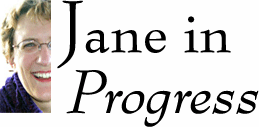 |
|
 |
 |
Looking for tips and tricks to the art of writing for television? Welcome to the blog of experienced television writer Jane Espenson. Check it out regularly to learn about spec scripts, writing dos and don'ts, and what Jane had for lunch! (RSS:  ) |
|
|
Home » Archives » March 2008 » A Way To Get To Write for Billie Holiday
[Previous entry: "The Fourth Track"] [Next entry: "Spitting on Expectations (Expectorations)"]
03/18/2008: A Way To Get To Write for Billie Holiday
Gentle Reader Lauren from Michigan writes in with a question I haven't seen before. She asks,
I was wondering when you are writing a script if you should include what musical selection you think should be played over the course of the scene and if so, should you be so detailed as to indicate which lines of the song would correspond best to the mood? How would you represent this in the script or is it best not to explore that aspect at all?
Great question. This actually is something you can do as a writer, although you should use it only very rarely and very carefully.
It's not unheard of to indicate a song that you'd like to hear in a scene. Here's a (slightly edited) stage direction from my first draft of an Angel script I wrote: The radio turns on my itself and changes stations, landing on the Mills Brothers singing "You Always Hurt the One You Love." A SHADOW falls across Cordelia's bed. An old lady voice comes out of nowhere...
And I can certainly imagine the last scene of a pilot looking something like this:
EXT. COURTYARD
And there, amid the wreckage of the wedding reception gone horribly wrong, Billie Holiday's version of "Embraceable You" wafts over the broken tables. Charles pulls Audrey into his arms. Here, finally, they get their wedding dance.
BILLIE HOLIDAY
I love all the many charms about you.
Above all, I want my arms about you...
Audrey laughs when Charles sings along for:
BILLIE HOLIDAY / CHARLES
Don't be a naughty baby,
Come to me, come to me, do...
We PULL BACK until they're very small in the frame, and then we...
FADE OUT
There. See how that could work? Of course, in the examples, the songs were actually part of the scene, not laid on top, but you can do that, too. For example, you could do a big moving montage of, say, all your characters going about their lives, like in the finale of The Wire, and indicate a song to play over it, perhaps even indicating which lines play under each image. It might be lovely, and would probably be scripted similarly to my example above, with the lyrics presented in dialog form.
But be very careful. I wouldn't do any indication of specific lyrics if there were any dialogue in the scene, for example. And even in a silent scene, there's going to be a tendency for lyrics to just make it seem too cute, too neat, too much like a "song fic," if you know what I mean.
If you really want to, give it a try and map out the scene with the lyrics, but I bet you end up editing them out later. At the very least they're frosting, and you're going to want that room for more actual cake.
Lunch: Garlic chicken and a banana milkshake from Versailles, a Cuban restaurant. So wonderful!
ADDENDUM: The amazing Friend-of-the-Blog Wendy Wallace, an experienced producer, writes in with this observation from her end of the process: I just wanted to give a producer's perspective on using songs & song lyrics in scripts. While it may not be pertinent for specs, I would remind your gentle readers that any songs used and/or any lyrics spoken by actors must be cleared & licensed accordingly before a script can be produced. Sometimes this is not a problem, but there are occasions where a song is unlicensable for whatever reason, necessitating either a complete revamp of the scene, last-minute shoe-horning of a different song into the existing scene (often not as fitting), or worse--a shelving of the script altogether. I'm not suggesting "never mention music in a script ever" as I've seen it used quite effectively, I would just encourage screenwriters--especially first-timers--to keep in mind the larger implications of their musical choices.
Wendy is right that this doesn't have to affect writers of purely speculative scripts, although I will point out that a spec script loaded with expensive music requirements isn't going to impress a reader with your ability to write to a budget.
Thank you, Wendy!
|
|
|
 |
|
Get Blog Updates Via Email
|
|
 |

